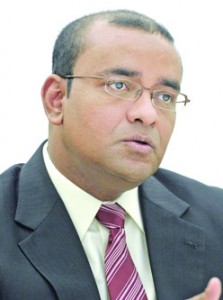
Bharrat Jagdeo
CARICOM heads have expressed dissatisfaction with the slow pace at which the ‘Jagdeo Initiative’ is being implemented within member states, noting that a more welcoming approach would see the region becoming more food rich.
Addressing the media following the just concluded agriculture ministerial meeting of the Council for Trade and Economic Development (COTED), Agriculture Minister Dr Leslie Ramsammy told a news gathering last Friday that while a number of activities were done across the region to satisfy the call for the implementation of the ‘Jagdeo Initiative’, it is still not enough.
“When we say that we are disappointed and that we have made slow progress, we don’t mean that there was a lag in implementation and we don’t mean that it was abandoned. What we did concede is that there is much room for energising the way we have embraced implementing the Jagdeo Initiative,” he said.
He disclosed that 11 Caribbean countries have so far formulated work plans with indicators as part of executing the components that the initiative outlines, adding that Guyana is among those listed.
The Jagdeo Initiative identifies and defines the key constraints facing agricultural development in the Caribbean and aims to develop and implement targeted, focused and practical interventions at both the regional and national levels to overcome these constraints.
Dr Ramsammy believes that the rigorous implementation of the initiative by all member states can ultimately result in a collective effort to reduce the region’s food import bill.
Food import bill
The import bill, which is one of the constraints identified in hindering the region’s development as the food basket, can therefore be addressed with the proper execution of the plan, he said.
As it stands, the region currently has a US$5 billion food import bill, with some US$200 million of the total going towards the importation of flour and another US$200 million for corn and soya for the stock feed industry, Dr Ramsammy explained.
“Indeed, one of the things we identified was the fact that we need to substitute for our imports… we believe that we could reduce the amount of wheat we import in the region by substituting with other kinds of flour in mixtures.”
In this regard, he said Guyana will be seeking alternatives and substitutes to certain food commodities, as it seeks to play its part in reducing imports.
He believes countries need to take innovative steps in using their local produce to substitute for imported products.
As such, he said Guyana will be looking to incorporate cassava and other ingredients into flour.
He added that “initiatives like those would lead to reduction through substitution”.
In light of this, Dr Ramsammy said CARICOM member states have reconfirmed that they will be utilising the Jagdeo Initiative as a means to ensure food security.
“We have worked with the Jagdeo Initiative in the past without timelines. We identified the alleviating activities but we didn’t give ourselves timelines,” he said, adding that more emphasis will now be placed on timelines.
Under the Jagdeo Initiative, it is expected that agriculture in the region will have made substantial progress in its contribution to sustainable growth, within a framework of transparent institutions and good governance that enables the transformation of its products and processes.



